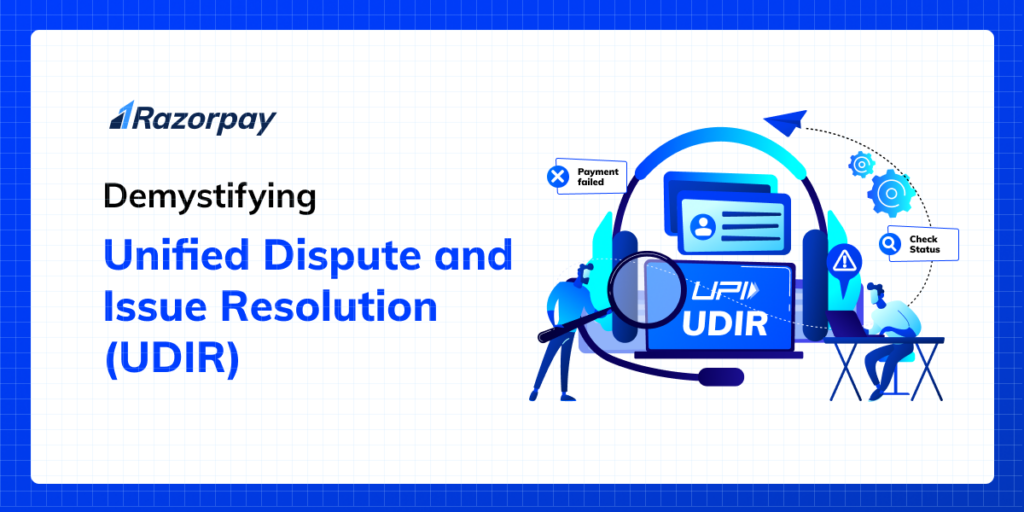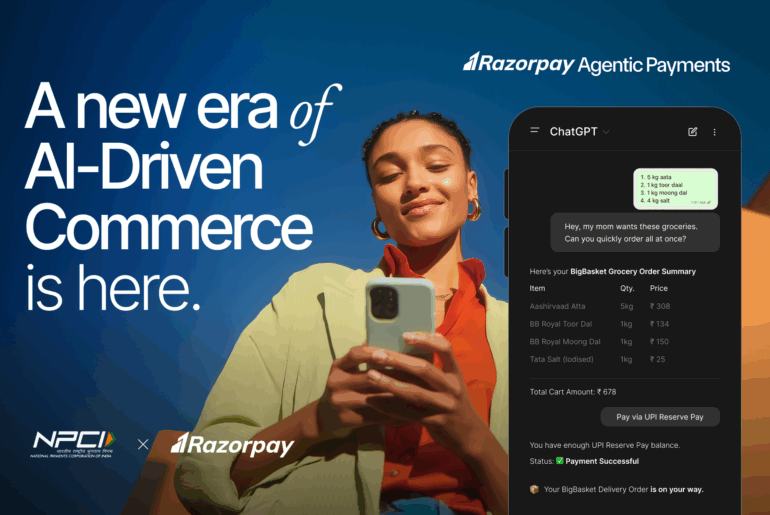In the realm of UPI payments, where convenience and speed reign supreme, the lingering issue of dispute resolution has often cast a shadow over an otherwise seamless experience. From endless calls, follow-ups and navigating the administrative maze, dealing with UPI payments disputes has long been a tedious and frustrating affair that leaves consumers feeling lost and unheard, and businesses to grapple with frauds & limited visibility
Those hassles are now days of the past, thanks to the introduction of Unified Dispute and Issue Resolution (UDIR). This is a significant stride taken by the National Payments Corporation of India (NPCI) towards enhancing customer confidence and satisfaction. But, what does this actually mean? Read on for a breakdown of this latest development in UPI payments.
Related Read: How UPI Dispute Redressal Mechanism Works
What is UDIR?
The Unified Dispute and Issue Resolution (UDIR) is a comprehensive framework designed by the NPCI to tackle the complexities involved in resolving disputes within the realm of UPI payments. It is an automated, single-channel redressal system that looks to resolve issues with digital payments via UPI quickly and efficiently.

Typically, a UPI payment is processed across four major entities, with NPCI making multiple calls between them to ensure payment success. When there are payment failures at different steps in this process, this leads to friction for customers, with businesses being held accountable.

How does UDIR tackle these challenges?
- Centralized Platform: UDIR consolidates all stakeholders onto a single, centralized platform, fostering seamless interaction among users, banks, and payment service providers. This consolidation streamlines the dispute resolution process, significantly decreasing the time required to address issues from days to just minutes.
- Real-time Communication: UDIR orchestrates a real-time conversation between users and banks, turning disputes into a swift and dynamic process. This not only enhances efficiency but also contributes to enhanced customer satisfaction.
- Transparent Tracking: UDIR unveils a transparent dispute resolution process, allowing users to witness the real-time progress of their dispute resolution, which in turn builds user confidence. Users can check the real-time status of the dispute raised within the UPI app, which also incentivises banks to expedite the resolution process.
- Automated Workflow: By harnessing automation, UDIR reduces manual intervention in dispute resolution. This not only accelerates resolution times but also minimizes the likelihood of errors, creating a more dependable and efficient system.
- Standardized Processes: UDIR establishes standardized processes for dispute resolution, promoting consistency and fairness. This standardization is essential in creating an equitable environment for all stakeholders, fostering trust within the digital financial ecosystem

How does UDIR work?
Imagine you’re placing an order for ice-cream on your favourite food delivery app. But when you’re taken to the payment page, something seems to have gone wrong, and the payment is not completed, but your money has been debited from your account. Now you’re left feeling frustrated, wondering what happened. With UDIR, you can raise a dispute against this transaction and here’s a breakdown of how dispute resolution would occur:
1. Continuous Polling for Real-Time Updates
- NPCI ensures real-time updates by continuously polling all participating banks until the final payment status is obtained. The UPI app will include a “Check Status” button, allowing users to monitor transactions with ease.
- In the absence of a response, NPCI persists in polling for the next 5 days, guaranteeing up-to-date information.
- Regardless of network delays or downtimes, NPCI maintains current transaction status through constant polling and rechecking.
2. Streamlined Dispute Resolution
- Customers can now raise a complaint against a transaction within the UPI app.
- For P2M (peer-to-merchant) transactions, if there is no response from the beneficiary bank or merchant after 3 days from the date of the transaction, the complaint will be automatically converted into a chargeback.
- For P2P (peer-to-peer) transactions, if there’s no response from the Beneficiary Bank by the day after the transaction (T+1), a chargeback will be automatically initiated.
3. Centralized Dispute Resolution
- NPCI’s UDIR acts as a centralized network for arbitration between customers and merchants.
- Automated fund movement decisions by NPCI prevent fraud and ensure fair dispute resolution.

UDIR Revolution: Transformative Benefits for Merchants & End-Users
Merchant Experience Improvements
Faster Payment Status Confirmation:
- Through the implementation of the Auto-update API, merchants can now receive real-time updates on the status of their transactions.
- This means merchants can promptly reconcile their accounts, reducing the time spent in uncertainty and improving financial management.
Faster Refunds:
- Refunds will now be processed more swiftly. Previously, the procedure relied on a file-based system, known for its time-consuming nature, usually taking 3-5 days.
- With the introduction of UDIR, refunds are now API-based, enabling real-time communication and streamlining the transaction reversal for faster and more efficient processing. This contributes to increased customer satisfaction and loyalty.
Fewer Chargebacks:
- UDIR minimizes chargebacks by preventing users from exploiting the system with inaccurate chargeback claims. Unlike current practices where merchants might face automatic processing of chargebacks if not responded to promptly, UDIR ensures accuracy in refund tracking, reducing the potential for large-scale fraud.
- Merchants are spared the hassle of dealing with chargebacks for transactions that have already been refunded, reducing administrative burdens and potential revenue loss.
Faster Dispute Resolution:
- As opposed to taking days to resolve disputes with customers being left in the dark about the resolution previously, merchants can now swiftly access information about problems in real-time and utilize APIs for faster solutions with UDIR.
- This improvement allows merchants to address disputes in a timely manner, minimizing the impact on their business, ensuring smooth business operations and maintaining customer satisfaction.
Customer Experience Improvements
Faster Payment Status Confirmation:
- Users can check their transaction status on demand on their preferred UPI App and receive updates on pending transactions.
- Users gain greater control and visibility into their pending transactions, reducing anxiety and enhancing confidence in the reliability of the payment process.
Faster Refunds:
- Refunds initially took 3-5 days to be completed as it relied on a file-based system which was a laborious and time-intensive process. UDIR now expedites that process by making it API-based, which is based on real-time communication.
- Customers experience faster resolution in the case of refunds, leading to a more satisfactory overall shopping experience.
Easier Complaints Handling:
- All UPI apps and bank apps will provide an easy way for users to raise complaints.
- This simplification of the complaints process empowers customers to voice concerns more efficiently, fostering a customer-centric approach to dispute resolution.
Faster Dispute Resolution:
- Users will receive faster resolutions and real-time confirmation of dispute status.
- Customers benefit from a more expedited dispute resolution process, reducing inconvenience and maintaining trust in the overall payment ecosystem.

Razorpay’s Readiness for UDIR
Because UDIR attempts to solve for latency in responses between the acquiring & issuing legs in any transaction on UPI, the implementation of this innovation is contingent on the collaboration and readiness of banks. Once banks begin to adopt UDIR, there will be a trickle down effect via payment aggregators to India’s businesses, big and small. Razorpay works closely with all the key UPI acquiring banks & is actively working towards readiness on UDIR in tandem with them.
Redefining the Landscape of Payments Dispute Resolution
The introduction of UDIR is a critical step towards enhancing trust and security in UPI payments for India’s businesses & consumers. UDIR serves as a fail-proof mechanism to ensure the authenticity and integrity of every transaction, thereby bolstering confidence among consumers to engage in the digital payment ecosystem. This aligns perfectly with Razorpay’s goals towards embracing innovation, & prioritization of payment security. We’re excited to adopt this innovation from NPCI & foster a safer, more inclusive digital ecosystem.


